How to earn brand authority at any budget
- Mar 16, 2023
- 9 min read
Updated: Feb 24, 2025
Author: Amanda Milligan

Authority is a fundamental component of search engine optimization. Because searchers (and thus potential customers) are constantly seeking trustworthy sources to satisfy their queries, it is search engines’ main objective to provide the most authoritative answers to those queries.
Authority is even covered at length in Google’s Search Quality Evaluator Guidelines as a component of trust:
![A screenshot of section 3.4 of Google’s search quailty evaluator guidelines that reads “Experience, expertise, authoritativeness and trustworthiness (e-e-a-t) are all important considerations in [page quality] rating. The most important member at the center of the e-e-a-t family is trust. There is also an image of a triple venn diagram featuring expertise, experience, and authoritativeness, with trust in the middle.](https://static.wixstatic.com/media/a484d4_4523bbdf3e63455ab7e2fe875ca484b2~mv2.png/v1/fill/w_741,h_351,al_c,q_85,enc_avif,quality_auto/a484d4_4523bbdf3e63455ab7e2fe875ca484b2~mv2.png)
So, brands must prioritize building their authority in the eyes of both readers and Google in order to rank well and garner high-quality site traffic.
In addition to the search visibility benefits, building authority also helps potential customers feel more comfortable interacting and transacting with your brand. Without authority, it’s an uphill battle to convince someone to trust you—you need to earn people’s attention (through search) and their trust.
So, the question is: How?
Let’s look at a few methods that have proven successful for brands of all sizes, whether you’re working with practically no resources or the budget of a Fortune 500 company, so that you can
improve your brand’s authority and, over time, fuel your organic growth.
Table of contents:
Building authority with little time and/or money
If you’re a bootstrapped entrepreneur who needed authority yesterday, here are a few strategies you can take advantage of in the short-term to give yourself a boost.
Tap into well-known industry directories
Respected directories, like G2 and Clutch, can help elevate your brand awareness and authority because they allow customers and clients to leave objective reviews, which others can read before working with you or buying your products/services.
If you’re a relatively new business, it may take some time before customers start leaving reviews. In the meantime, you can at least establish a profile in these directories to build out your branded search results.
Some of these directory sites consistently rank near the top of Google’s results for branded queries, meaning the search engine result page (SERP) for your brand can feature these authority signals.
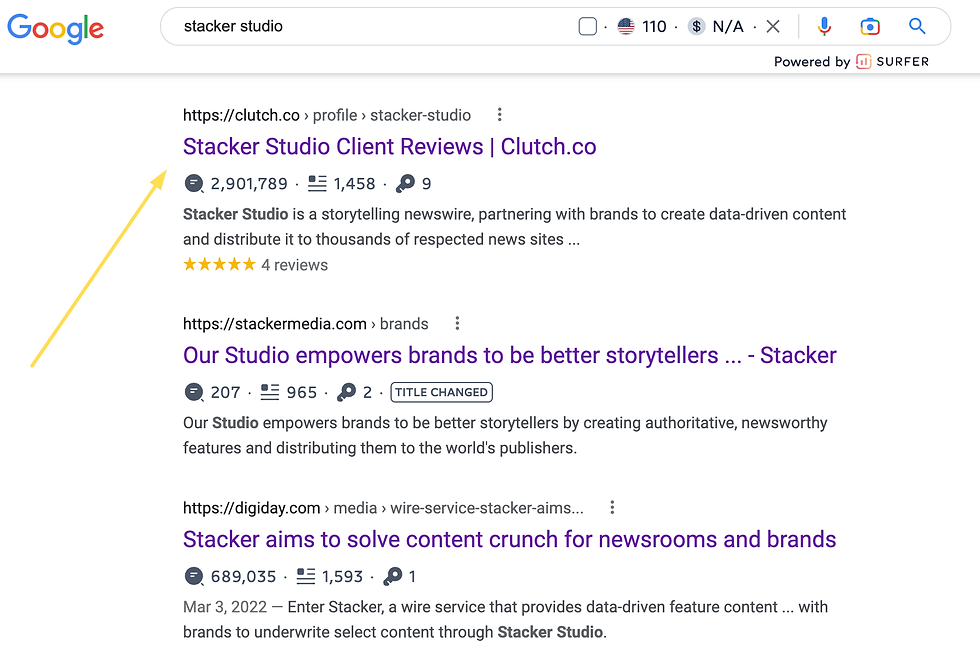
As an example, I work for Stacker Studio, and our Clutch profile is the second organic result when you search our brand. The five gold stars in the result help instill confidence that we know what we’re doing—you can leverage this tactic for your own brand without spending a cent.
While establishing a presence on relevant directory sites is already advantageous, there’s more you can do to make the most of the opportunity and build out your authority:
Manage your reviews — Respond to reviews left for you (if possible), whether they’re positive or negative shows that you’re attentive, that you’re listening to your clients/customers, and that you’re always striving to improve. Transparency always helps build authority.
Share your ratings/reviews — Oftentimes review sites provide widgets or images that showcase your reviews; add these widgets to your website so prospective customers won’t have to dig around to find these authority signals.
Publish testimonials/case studies
If you already have an existing customer base, you can ask your customers (or clients) for testimonials. A couple of sentences strategically placed on your marketing materials and landing pages can translate to more conversions, more customers/clients, and more revenue.
Successful testimonials tend to highlight the following elements:
What you accomplished for them
What they enjoyed most about your product/service
Why they’d recommend your brand to others
If you have a bit more time and you’re a services-based business, create case studies that showcase how you helped your client.
Your case studies should include:
The problem or challenge your customer/client was facing
How you helped them surmount that problem/challenge
Data to back up the claims you’re making
Ideally a quote from the client to provide their direct perspective
And, if your business sells directly to consumers, you can build out the review sections of your site and also monitor third-party review sites like Yelp, TripAdvisor, Google, and so on.
Managing your presence and responding to reviews across these platforms requires dedication, but it’s an excellent way to shape your reputation and convey authority when you’re working on a tight budget.
Building authority with some time but still no money
Have more time to invest in building authority but working with a limited budget? In this case, a few more options are available to you.
Build trust with your current customers/clients
This suggestion may seem a bit odd, but it’s advice I’ve read time and time again, and I wholeheartedly agree: Shadow your customer service or client experience teams.
This powerful tactic provides you with direct access to your audience’s complaints and challenges, allowing you to create content that better serves them (as well as prospective clients/customers) and thus has a higher chance of ranking well for relevant queries.
It’s also worth noting that high-quality customer service can be a huge authority builder in and of itself. It’s not enough to get people to trust you just long enough to give you money; you have to maintain their trust so they remain a client or become a repeat customer.
To that end, here are a few types of content you can create to foster more authority and supplement your customer service team’s efforts:
Troubleshooting documents
Expert blog posts on topics related to your offering
If your customers/clients have these questions, others are likely to have them as well. Answer the product- or service-specific questions, but don’t be afraid to tackle ones that are a little more tangential but still helpful.
Earn digital PR so others “vouch” for you
Digital PR is an excellent strategy for simultaneously building authority and awareness if you’re newer to the industry or are up against powerhouse, ubiquitous brands.
However, it’s not easy to execute well. Only pursue this option if you accept that earned media is just that—earned. While digital PR can come with some incredible benefits when done correctly (such as backlinks and/or exposure via trusted publications), it takes a lot of time and effort to do well.
If you’re up to the task, start by identifying who at your organization will serve as the expert. If this poses a challenge, seek out people who enjoy personal brand building and sharing their knowledge.
When you have at least one person who’s willing and able to speak on behalf of the brand:
Pitch them to be a guest on relevant industry podcasts that your audience listens to. Tools like SparkToro are useful in identifying these podcasts.
Ask if they’re willing to be a source for news articles. Sign up for HARO and reply to relevant queries with expert quotes.
If they’re very enthusiastic, pitch them to speak at industry conferences and events or have them write guest posts you can pitch to industry publications.
As an example, I pitched to speak at SearchLove in 2022, got accepted, and spoke at both their San Diego and Philadelphia conferences on behalf of Stacker Studio. Not only did I earn authority for myself and my brand by speaking at a respected event, but also through promoting my acceptance, because other marketers know my pitch had to be vetted in order to be invited to speak.
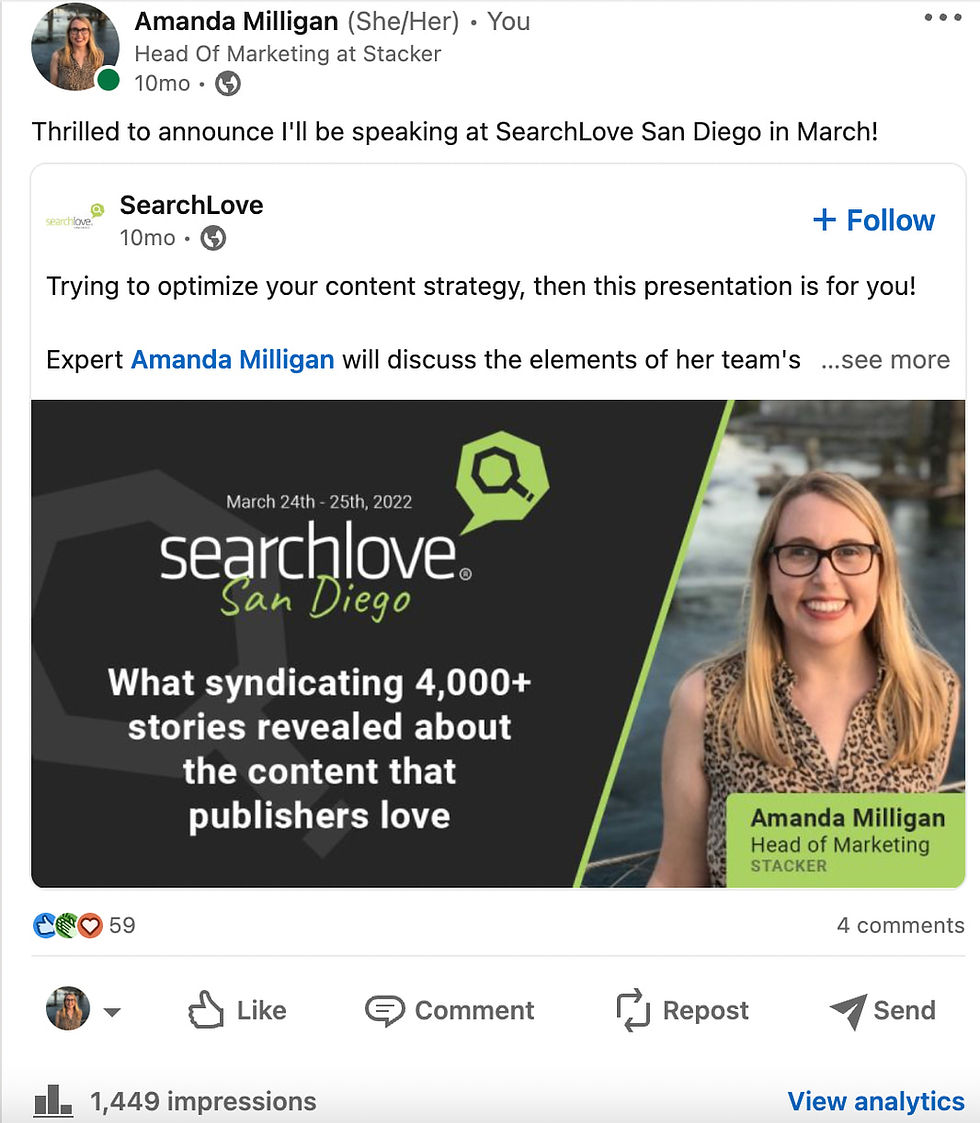
It’s a lot of effort, but the reward is getting your expertise featured on a third-party site, which automatically adds credibility to your brand. Plus, there are amazing SEO benefits, like earning backlinks and brand mentions, which are signals Google may use to assess your domain’s authority.
Co-market to align with like-minded brands
Partnering with a well-respected brand that complements what you’re doing can immediately elevate your reputation among their audience (who hopefully are good candidates to be your audience, too).
To create this sort of co-marketing campaign, though, you have to have something to offer the other brand. If your plan is to leverage their community and clout, then you’ll probably need to do the heavy-lifting of putting the campaign together. They’ll be more likely to sign onto something that’s little work for them, but provides value to their audience.
For example, since my company is newer in the industry, I wanted to partner with brands that are respected and complement our service offering. I reached out to Verblio, MarketMuse, and Seer Interactive about creating a piece of content together that spoke to each of our strengths and would help us drive leads. Together, we created an epic 3,000+ word guide about how to scale your SEO efforts, and it’s something that benefits all of us.
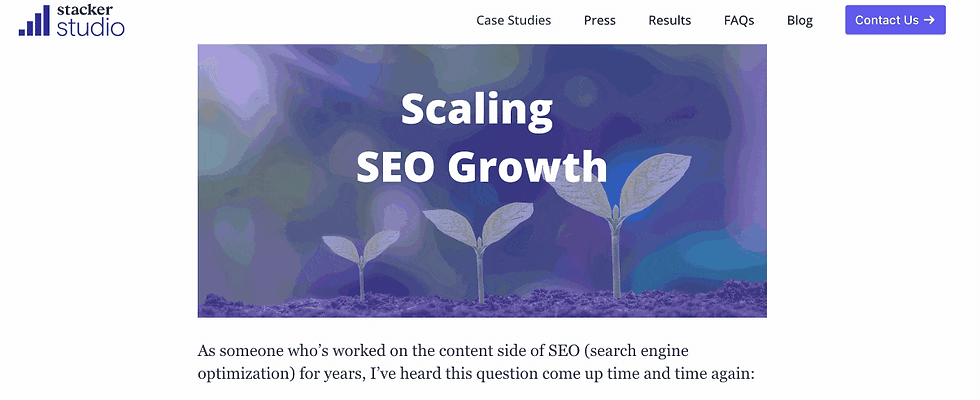
Ask yourself: Which brands do you want to be “friends” with? What value can you provide them in order to work together?
Scaling your brand authority with access to budget
If you have more resources to work with, you can add fuel to the fire. Almost every one of the techniques I’ve already talked about can be amplified to have a greater impact.
But, let’s focus on the approaches I think can most significantly move the needle.
Partner with a trusted influencer
There’s a reason influencer marketing was such a hot topic in the 2010s. Articles like this one from Adweek were saying that influencers had a major impact on purchasing decisions.

When done right, it makes sense: As buyers, we often know influencers are paid to talk about a product or service, but we also hope they’ve vetted these options and picked out the ones they actually like. After all, they’re only considered influencers because they’ve already earned their audience’s trust.
Seeing folks online whom we trust talk about a product or service favorably not only impacts buying decisions, but can very positively impact your authority. The more invested an influencer is in what you’re offering, the more organic their promotion feels because they genuinely do support what they’re promoting.
I took this into consideration when sponsoring a podcast on behalf of my company. As someone in the industry who’s respected SEO consultant Dan Shure for a while, I knew he was generally regarded as an expert in the field.
So, I reached out with intent to sponsor his podcast, and we had conversations about what our company was and answered any questions he had. Now, he talks about our brand authentically on the show despite us being a sponsor; he truly likes what we do.
The more it’s set up like a paid partnership rather than a one-and-done ad, the more it’ll improve your brand’s authority.
Invest in content marketing
“Content marketing” is a behemoth term, because it refers to any content that your brand creates for any marketing goal. That could be brand awareness, organic traffic, customer retention, and, of course, authority building.
There’s often a lot of goal overlap, but when focusing on authority building, ranking in the SERPs goes a long way. This has a direct overlap with SEO efforts to increase organic traffic, but consider the authority building ramifications, too.
If someone searches for something, and your site is the first result, that signals to the user that Google identified your page as the best resource to help. It reinforces that you know what you’re talking about.
But, the content itself can also communicate authority. When you take the time to sit down and write genuinely useful content, and you invest in adding useful graphics and promoting the article so it reaches the right audiences, and that article starts to rank, people will read your piece and (hopefully) remember that you helped them out.
Ahrefs is great at this. It has built a ton of authority thanks to its comprehensive blog posts that either dive into data or offer a ton of context to help users perform SEO (like the example below).
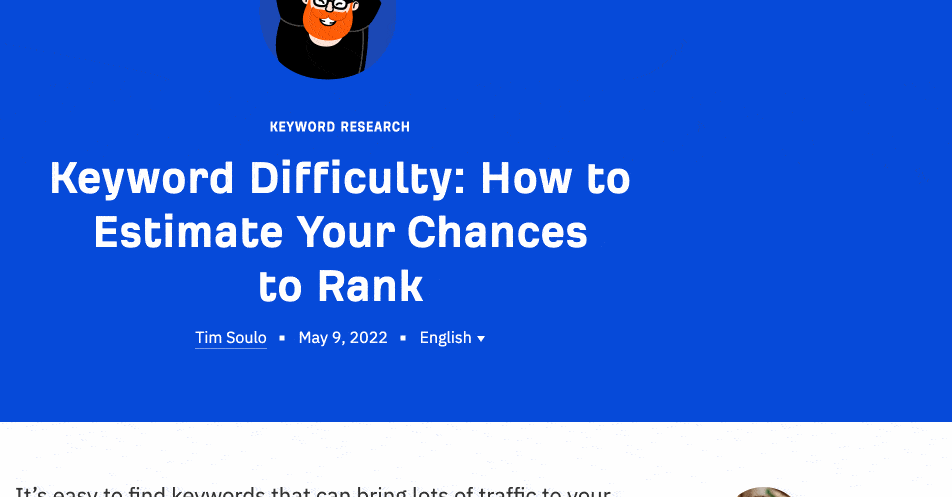
Content is the best way to show your expertise (rather than merely talk about it). You can say you’re an expert in anything, but without having the content to back it up, how can potential customers be sure?
Level-up your digital PR
After you’ve pitched podcasts, conferences, guest posts, and so on, it’s time to think about how to scale this effort and build even more trust with the widest possible audience.
Earned media is excellent in this regard. When a respected publication or blog chooses to cover your content or brand, that sends a significant trust signal to readers.
Sometimes, when a press release for a significant update about your company/product/service goes out, you can get some good coverage. But usually, when things are business-as-usual, you have to offer value to a writer’s story in order to earn that coverage.
I mentioned HARO previously, and that works here, as well. But if you want to be more proactive (rather than reactive) in order to earn media consistently, you need to create newsworthy content.
There are many elements of newsworthiness to use for brainstorming, including timeliness, proximity, and significance.
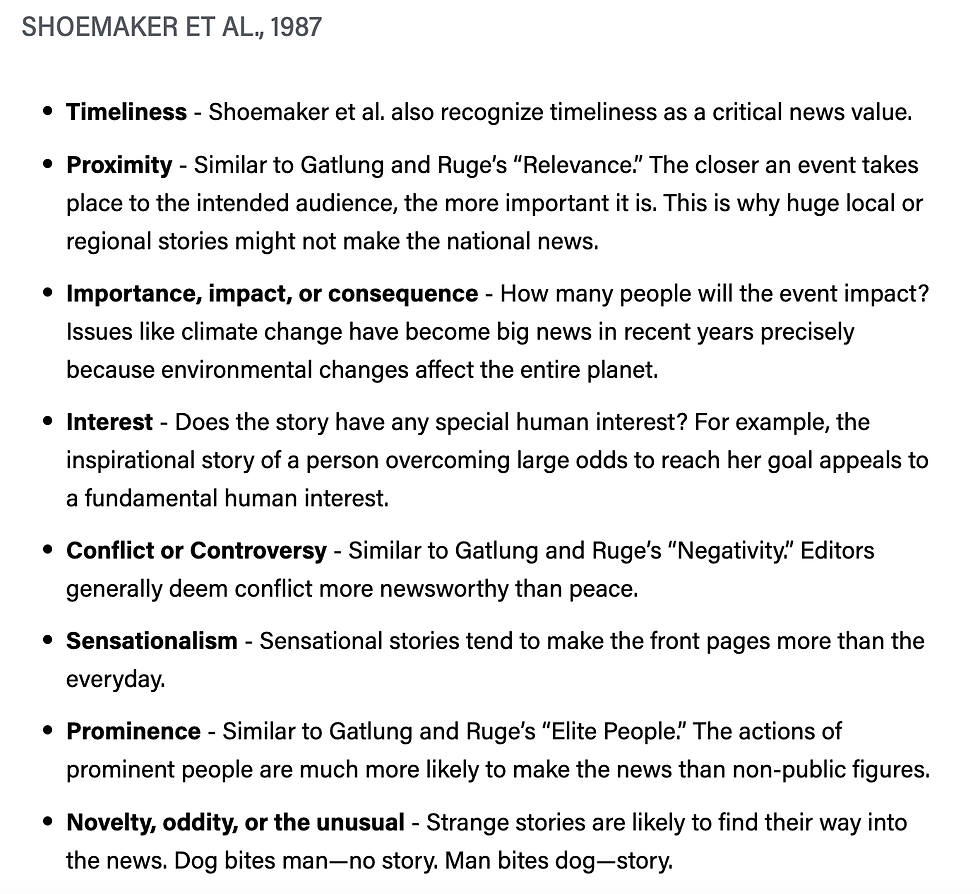
Obviously, as digital marketers, we can’t exactly dive into the world of breaking news. So, we have to either create or complement it.
The best way to do this is with data. Why? Because when you’re the first to analyze or illustrate data in a certain way, it often reveals new, interesting insights that haven’t been published or talked about yet.
That makes it much easier to pitch your content/report/study/survey to publishers and get their attention!
If you have internal data that you can make publicly available and that would be insightful for readers, this is a great way to start. Look, for example, at how GasBuddy tracks gas prices and receives media coverage since it’s so relevant for readers on the local level.

If you don’t have internal data, there are a ton of free, publicly available datasets out there. Government sites are a great place to start, like the Census and Bureau of Labor Statistics.
It’s a lot of work to put a data report together, but you can get some of the most high-quality media coverage possible using this method, and that builds significant credibility.
Building authority means building a foundation for all your marketing efforts
SEO (and any sort of marketing) involves crucial decisions about what to prioritize. Authority is one of those elements that uplifts all other efforts, so it should be high up on your priority list. No matter how much time and money you have available, building authority will help you move the needle and set up a good foundation for your other efforts, like going international or launching a new line of products for a new audience.

Amanda Milligan is an inbound marketing expert with more than a decade of experience in content, growth, and brand. Her knowledge has been featured in Entrepreneur, Forbes, TechCrunch, and more, as well as conferences like SMX, MozCon, SearchLove, and Pubcon. Twitter | Linkedin


